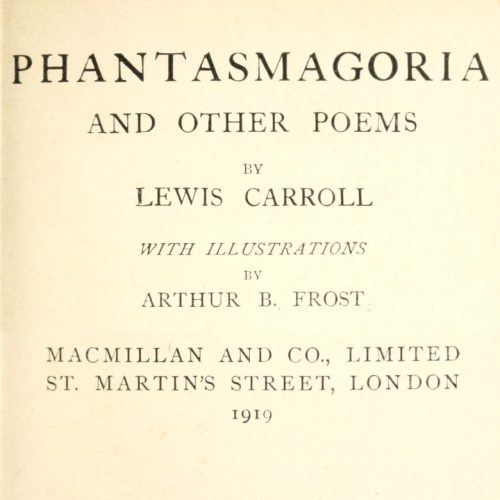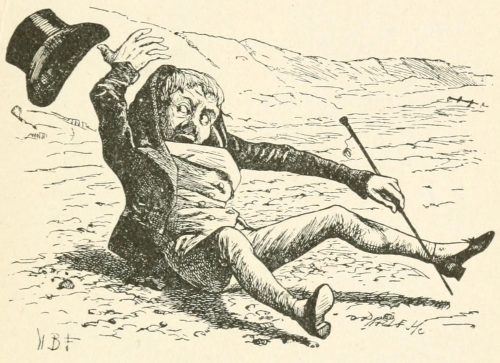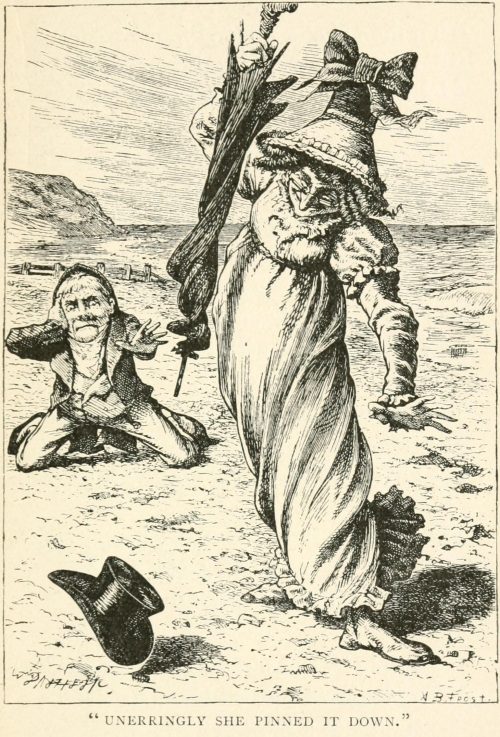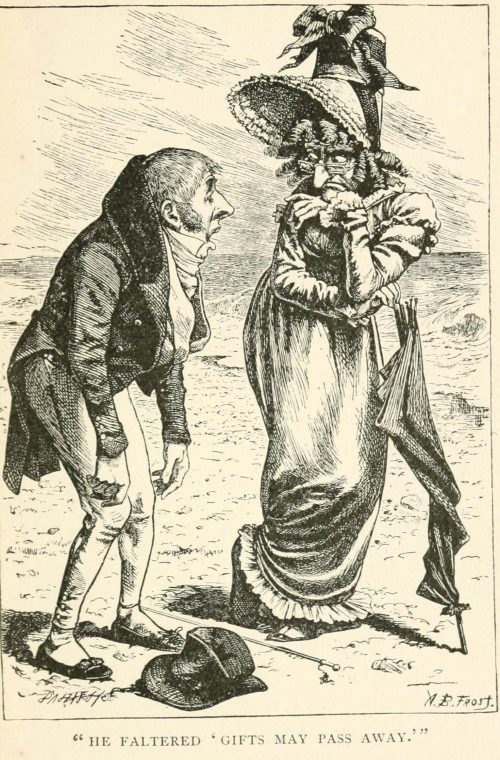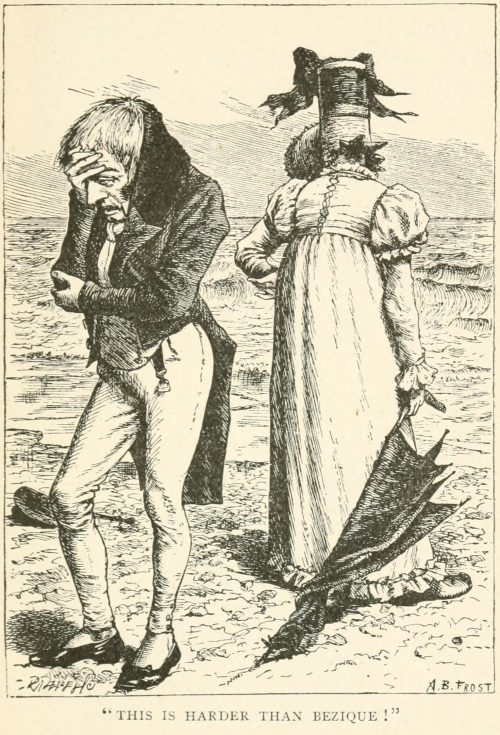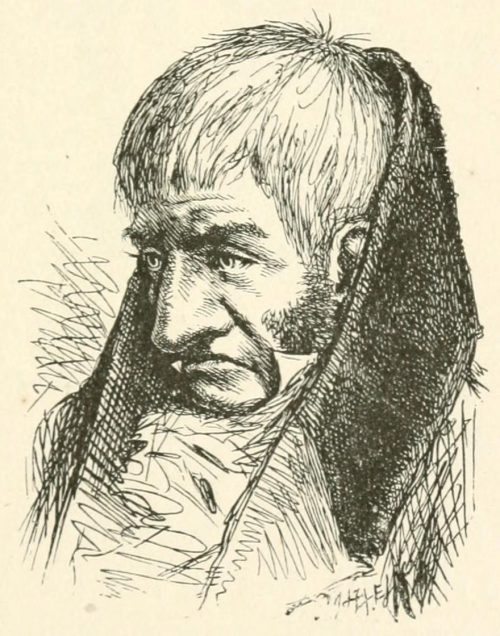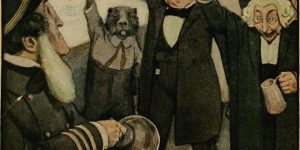The Three Voices Poem by Lewis Carroll (Charles Dodgson)
Poetry from Phantasmagoria and Other Poems.
The Three Voices Poem
The Three Voices Poem Contents
Lewis Carroll – The Three Voices Poem : The First Voice
Lewis Carroll – The Three Voices Poem : The Second Voice
Lewis Carroll – The Three Voices Poem : The Third Voice
Lewis Carroll – The Three Voices Poem : The First Voice
He trilled a carol fresh and free,
He laughed aloud for very glee:
There came a breeze from off the sea:
It passed athwart the glooming flat—
It fanned his forehead as he sat—
It lightly bore away his hat,
All to the feet of one who stood
Like maid enchanted in a wood,
Frowning as darkly as she could.
With huge umbrella, lank and brown,
Unerringly she pinned it down,
Right through the centre of the crown.
Then, with an aspect cold and grim,
Regardless of its battered rim,
She took it up and gave it him.
A while like one in dreams he stood,
Then faltered forth his gratitude
In words just short of being rude:
For it had lost its shape and shine,
And it had cost him four-and-nine,
And he was going out to dine.
“To dine!” she sneered in acid tone.
“To bend thy being to a bone
Clothed in a radiance not its own!”
The tear-drop trickled to his chin:
There was a meaning in her grin
That made him feel on fire within.
“Term it not ‘radiance,'” said he:
“‘Tis solid nutriment to me.
Dinner is Dinner: Tea is Tea.”
And she “Yea so? Yet wherefore cease?
Let thy scant knowledge find increase.
Say ‘Men are Men, and Geese are Geese.'”
He moaned: he knew not what to say.
The thought “That I could get away!”
Strove with the thought “But I must stay.
“To dine!” she shrieked in dragon-wrath.
“To swallow wines all foam and froth!
To simper at a table-cloth!
“Say, can thy noble spirit stoop
To join the gormandising troup
Who find a solace in the soup?
“Canst thou desire or pie or puff?
Thy well-bred manners were enough,
Without such gross material stuff.”
“Yet well-bred men,” he faintly said,
“Are not willing to be fed:
Nor are they well without the bread.”
Her visage scorched him ere she spoke:
“There are,” she said, “a kind of folk
Who have no horror of a joke.
“Such wretches live: they take their share
Of common earth and common air:
We come across them here and there:
“We grant them—there is no escape—
A sort of semi-human shape
Suggestive of the man-like Ape.”
“In all such theories,” said he,
“One fixed exception there must be.
That is, the Present Company.”
Baffled, she gave a wolfish bark:
He, aiming blindly in the dark,
With random shaft had pierced the mark.
She felt that her defeat was plain,
Yet madly strove with might and main
To get the upper hand again.
Fixing her eyes upon the beach,
As though unconscious of his speech,
She said “Each gives to more than each.”
He could not answer yea or nay:
He faltered “Gifts may pass away.”
Yet knew not what he meant to say.
“If that be so,” she straight replied,
“Each heart with each doth coincide.
What boots it? For the world is wide.”
“The world is but a Thought,” said he:
“The vast unfathomable sea
Is but a Notion—unto me.”
And darkly fell her answer dread
Upon his unresisting head,
Like half a hundredweight of lead.
“The Good and Great must ever shun
That reckless and abandoned one
Who stoops to perpetrate a pun.
“The man that smokes—that reads the Times—
That goes to Christmas Pantomimes—
Is capable of any crimes!”
He felt it was his turn to speak,
And, with a shamed and crimson cheek,
Moaned “This is harder than Bezique!”
But when she asked him “Wherefore so?”
He felt his very whiskers glow,
And frankly owned “I do not know.”
While, like broad waves of golden grain,
Or sunlit hues on cloistered pane,
His colour came and went again.
Pitying his obvious distress,
Yet with a tinge of bitterness,
She said “The More exceeds the Less.”
“A truth of such undoubted weight,”
He urged, “and so extreme in date,
It were superfluous to state.”
Roused into sudden passion, she
In tone of cold malignity:
“To others, yea: but not to thee.”
But when she saw him quail and quake,
And when he urged “For pity’s sake!”
Once more in gentle tones she spake.
“Thought in the mind doth still abide
That is by Intellect supplied,
And within that Idea doth hide:
“And he, that yearns the truth to know,
Still further inwardly may go,
And find Idea from Notion flow:
“And thus the chain, that sages sought,
Is to a glorious circle wrought,
For Notion hath its source in Thought.”
So passed they on with even pace:
Yet gradually one might trace
A shadow growing on his face.

